#OTD in 1979, the University of Notre Dame Press published “Gunpowder Justice: A Reassessment of the Texas Rangers,” by Julian Samora, Joe Bernal, and Albert Peña.
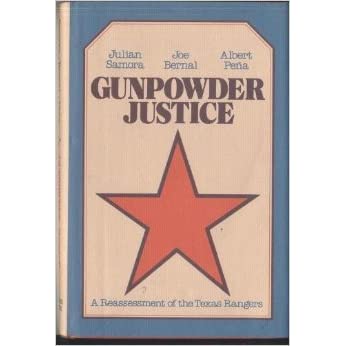
The book surveys Ranger history from 19th century frontier violence to the Mexican American civil rights struggles to which the authors had contributed. “The victims of the Rangers . . are now civil rights workers and members of striking unions.” (12)
It thus covers actions before the Rangers were “professionalized” in the 1920s, such as fighting Juan Cortina and hunting Gregorio Cortez, but also efforts to defeat Mexican American city council candidates in Crystal City in 1963 and break a farmworker strike.
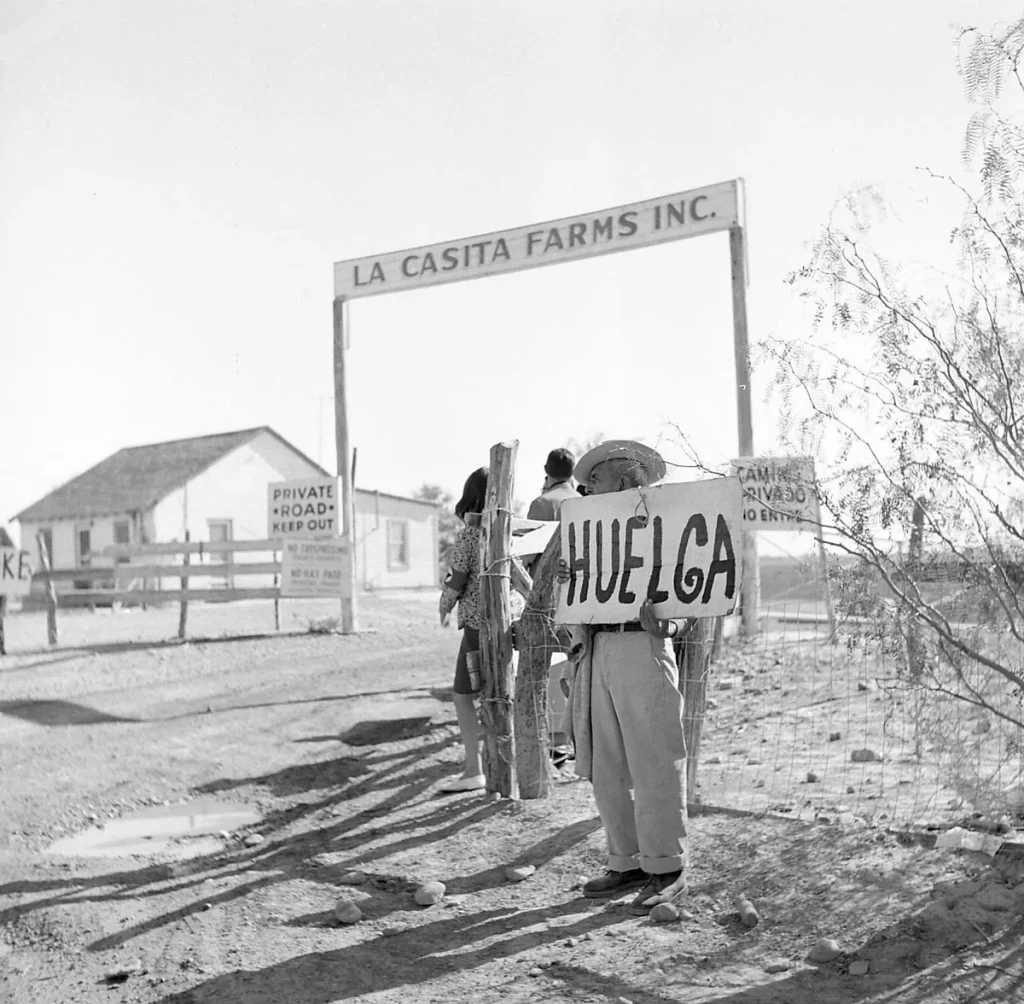
Samora, Bernal, and Peña look beyond Ranger lawbreaking to the underlying racial logic of their violence – “the visceral belief that the Anglo has exclusive rights to the political, educational, and economic processes” (11).
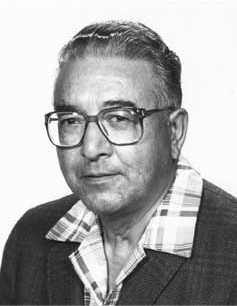
The authors treated the Rangers as historical actors, but also as curators of their own images. “They have been their own most dedicated press agents: from the early frontier days . . . climaxing in 1973 . . with the establishment of a Ranger Hall of Fame.”
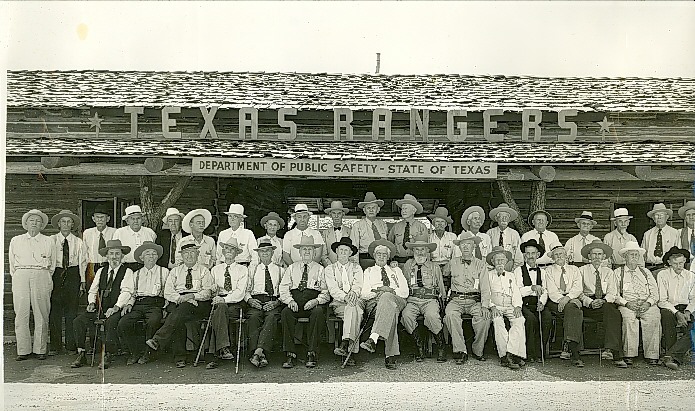
Samora was the first Chicano to receive a PhD in Sociology; he long taught at Notre Dame and co-founded the National Council of La Raza, the Mexican-American Legal Defense and Education Fund and the Southwest Voter Registration and Education Project. https://latinostudies.nd.edu/about/history/julian-samora/
Joe Bernal (1927-) was a Texas state legislator and educational activist; Peña (1917-2006) was also from San Antonio, where he held county and judicial offices. Both worked closely with Black civil rights activists.
https://library.uta.edu/tejanovoices/interview.php?cmasno=169
The three thus combined academic expertise with their own experiences as civil rights activists. Their work shows just how central the Rangers were to Mexican American civil rights movements and historical consciousness in the 1970s and beyond. https://www.nisd.net/bernal/about/namesake
Gunpowder Justice was widely reviewed in the popular press and academic publications, sometimes positively and sometimes critically.
Jim Palmer of the Ft. Worth Star-Telegram declared that it “makes no pretense of objectivity. It fails to make a convincing case for dismantling the Rangers, joining a long line of ineffective voices.” Primarily, Palmer took issue with the original title, “Los Rinches.”
The Monitor echoed this, stating that “For a complete picture, the reader should consult media accounts, which cite law bending and breaking on both sides, and one of the many Ranger histories.”
Yet this review named no specific titles for the reader to turn to in its repetition of an all too familiar claim that both sides made mistakes.
The Journal of American History featured a review from Marilyn McAdams Sibley that proclaimed, “Overall, the book both defines the dilemma of the Mexican-American in Texas and deals with the interweaving of myth and fact in history.”
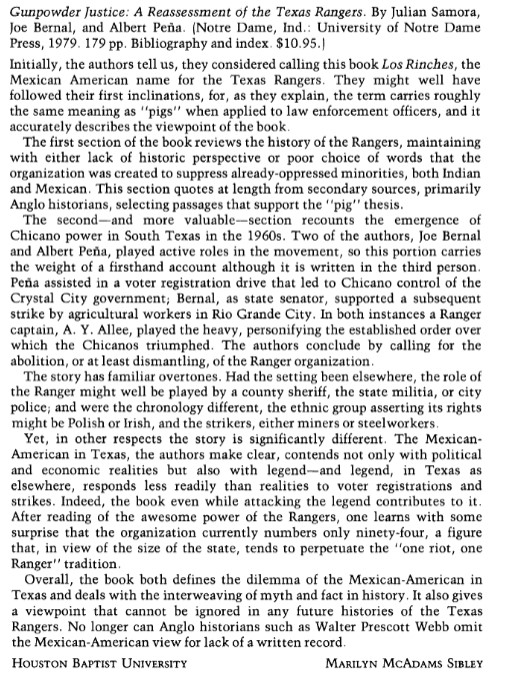
“It also gives a viewpoint that cannot be ignored in any future histories of the Texas Rangers. No longer can Anglo historians such as Walter Prescott Webb omit the Mexican-American view for lack of a written record.”
In the WHQ, Larry D. Ball recognized a “healthy corrective to the overriding Anglo influence in the field of law enforcement studies” but said it lacked a balanced history of the Ranger force, asserting that a historian would have to tackle this task.
More than 40 years after publication, in the midst of Black mobilizations against racist policing, “Gunpowder Justice” remains insightful in its treatment of race, policing, and myth.
In 1986, Albert Peña, one of the contributors, told the Austin American-Statesman that “Why should we allow their [Rangers] white-hat image to be perpetuated? They’re an anachronism.”
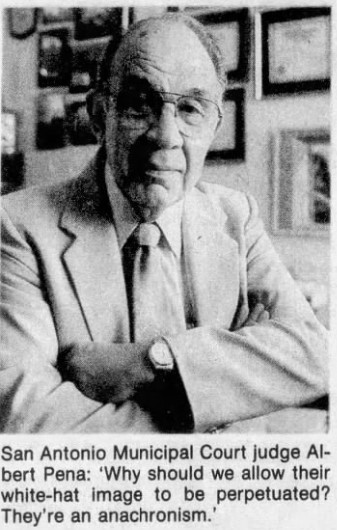
Despite its importance, “Gunpowder Justice” is not mentioned in the @txrangermuseum’s recommended reading (nor is any other book with a Hispanic editor or author). https://www.texasranger.org/texas-ranger-museum/education/recommended-reading/
This thread is a part of the #OTD in Ranger history campaign that @Refusing2Forget is running this year. Follow this twitter handle or https://refusingtoforget.org/ranger-bicentennial-project/, and visit our website https://refusingtoforget.org to learn more.
Refusing to Forget members are @ccarmonawriter @carmona2208 @acerift @soniahistoria @BenjaminHJohns1 @LeahLochoa @MonicaMnzMtz and @Alacranita, another co-founder is @GonzalesT956
@emmpask @sdcroll @HistoryBrian @LorienTinuviel @hangryhistorian, @ddsanchez432,
@elprofeml, and @littlejohnjeff are other scholars working on this project.

